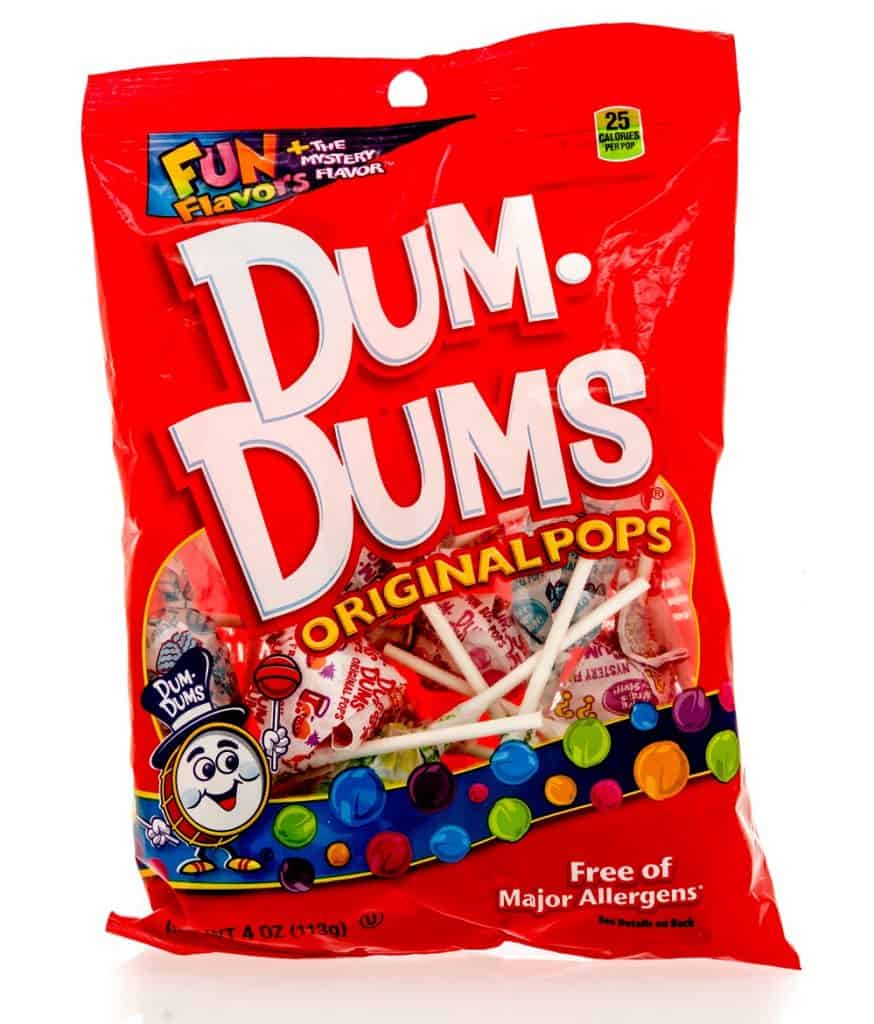Originally invented in 1924, Dum Dums are a classic American lollipop brand that comes in 16 different flavors. Anecdotally, the name comes from the fact that it was an easy name for children to say and remember. The lollipop brand was first created by Akron Candy Co. but it was later purchased by its current owner, Spangler Candy. Dum Dums is now one of the most recognized brands of candy in the country and the company calls it “America’s Favorite Giveaway Treat.”
Having been first invented all the way back in 1924, it should come as no surprise that the ingredients that make Dum Dums are relatively simple. With the exclusion of anything obviously animal-derived, Dum Dums should be fine for most vegans. Unfortunately, the lollipop brand contains other ingredients that can cause some division. Gray area ingredients such as sugar and artificial coloring agents are accepted by some vegans while avoided by some.
Table of Contents
Are Dum Dums Vegan?

According to dietary vegans, Dum Dums should be perfectly fine for consumption since the lollipop brand does not contain any obvious or blatant animal product or derivative. The ingredients for the candy are relatively simple as it mainly consists of sweeteners, flavoring agents, and coloring agents.
However, there are some ingredients that fall under the gray area category. These are ingredients that are not unanimously agreed upon by the vegan community. In Dum Dums, these ingredients include sugar and artificial coloring agents.
Dum Dums Ingredients List
The list of ingredients of the original Dum Dums includes (1): sugar, corn syrup, citric acid, malic acid, salt, artificial flavor, color added (includes red 40, yellow 6, yellow 5, blue 1).
The official Dum Dums website offers a wide selection of different flavors and varieties to choose from (2). Aside from the original flavor, people can also choose to get Dum Dums in Tropical Mix, Hawaiian Punch, Flavor Fusion, Orchard Mix, Limited Edition, and so on. Although Dum Dums characteristically come in spherical shapes, people can also avail of the candy in different shapes such as heart-shaped or bunny-shaped.
Despite the different flavors and shapes Dum Dums come in, they are still made of ingredients similar to that of the original Dum Dums.
Sugar
Sugar is a common ingredient used in various food items and beverages and it is an incredibly important component for candies such as Dum Dums. Although sugar is conventionally obtained from a plant source such as sugarcanes or sugar beets, sugar can possibly become non-vegan depending on how it was produced.
After the sugar has been extracted from a certain plant source, the crude form of it can already be consumed. However, sugar companies subject their sugar to further refinement processes that make the sugar more appealing to the consumer market. Various methods can be employed when further refining sugar. However, there is one method that is particularly concerning for vegans.
One method that is commonly done in the sugar industry is filtration. By passing sugar juice through a filter, the process helps increase the purity of the sugar by removing some non-sugar components. Different filtration methods can be used by these sugar companies. Some companies use granulated carbon as an effective filter. However, some sugar companies use bone char – the charred and skeletal remains of animals (3). Although bone char is a cheap and effective filter, sugar that has been processed using bone char can no longer be considered vegan since it is an animal product.
Determining whether sugar has been processed using bone char is already difficult enough, but the issue is even further exacerbated when large food companies have multiple sources for sugar. It means this makes it even more difficult to determine if the sugar that is in a product is truly vegan or not. The uncertainty of how sugar is processed is why many vegans consider sugar to be a gray area ingredient and would rather avoid it to make sure.
Since the use of bone char is a more prevalent practice in the US, vegans from other parts of the world are less worried if their sugar is vegan or not.
Food Coloring Agents
Color is an incredibly important part of the consumer experience, especially when it is for a product marketed for children such as Dum Dums. It has long been understood that the visual appearance of a food product plays a major role in how people perceive them. Thus, food and beverage manufacturers sometimes have to play an active role in controlling the colors of their products. This is where food coloring agents come in.
Food coloring agents are simply various substances that allow food products and drinks to have a certain color. There are many coloring agents that the industries use. Some of them are perfectly fine for vegans while some are certainly non-vegan. However, artificial coloring agents are somewhat debatable.
Artificial coloring agents are completely synthesized in laboratories from relatively simple substrates. Undeniably, these artificial coloring agents are devoid of animal products or derivates which should make them vegan for most people, especially dietary vegans. However, some vegans believe artificial coloring agents impose an ethical issue.
Since artificial coloring agents are synthesized in the lab, it is important to ascertain that these substances are safe for human consumption. Hence, various food safety authorities like the FDA (Food and Drug Administration) and the EFSA (European Food Safety Authority) requires these artificial coloring agents to undergo numerous safety tests before they are allowed to be used in food and beverage products.
Safety will always be a top priority. However, the issue with the ethics of artificial coloring agents is that these substances have long been documented to be tested on animal models. Animal testing is considered by many to be highly unethical due to the inhumane treatment of the animals involved. It is especially unethical when modern alternatives can be used for safety testing instead such as the use of cell models and in silico studies (i.e., the use of computer models and algorithms).
For multicolored Dum Dums, the artificial coloring agents that are listed include red 40, yellow 6, yellow 5, and blue 1. These artificial coloring agents have been reported to be tested on various animals such as rats, mice, pigs, dogs, rabbits, and so on (4, 5, 6, 7).
References
1. https://www.dumdumpops.com/
2. https://www.spanglercandy.com/
7. https://www.efsa.europa.eu/
Featured Image Editorial credit: Chelsea Lussier / Shutterstock.com




